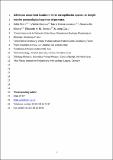Inferences about food location in three cercopithecine species : an insight into the socioecological cognition of primates
Abstract
Many animal species use a variety of cognitive strategies to locate food resources. One strategy is to make inferences by exclusion, i.e., perceiving the absence of reward as a cue that another location should be investigated. The use of such advanced cognitive strategies may be more prominent in species that are known to frequently solve social challenges, and inferential reasoning has mainly been investigated in social species such as corvids, dogs, dolphins and non-human primates. In this paper, we investigate how far social intricacy may explain the disparity of reasoning performances observed in three cercopithecine species that differ in the density of their social network and the diversity of their social partners. We used standard reasoning tasks, testing the volume concept and inference by exclusion using visual and auditory modalities. We showed that Old World monkeys can infer the location of invisible food by exclusion. In addition, Tonkean macaques and olive baboons had greater performances in most tasks compared to rhesus macaques. These responses are consistent with the social complexity displayed by these three species. We suggest that the cognitive strategies required to navigate through a demanding social world are involved in the understanding of the physical domain.
Citation
Petit , O , Dufour , V , Herrenschmidt , M , De Marco , A , Sterck , E H M & Call , J 2015 , ' Inferences about food location in three cercopithecine species : an insight into the socioecological cognition of primates ' , Animal Cognition , vol. 18 , no. 4 , pp. 821-830 . https://doi.org/10.1007/s10071-015-0848-2
Publication
Animal Cognition
Status
Peer reviewed
ISSN
1435-9448Type
Journal article
Collections
Items in the St Andrews Research Repository are protected by copyright, with all rights reserved, unless otherwise indicated.

